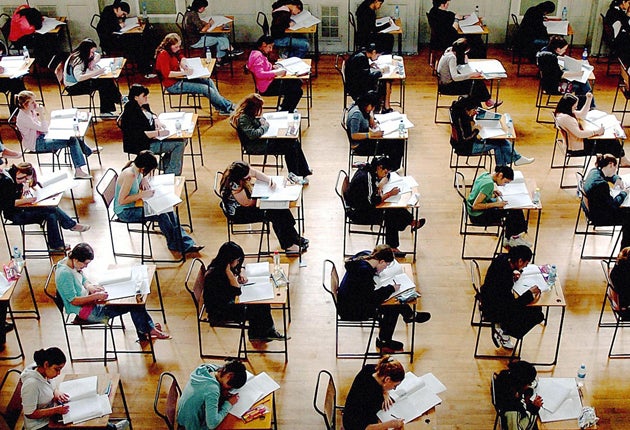A-level passes set to hit peak – then questions will get tougher
With under 3 per cent likely to fail, this will be the 27th year in a row that marks have gone up

Your support helps us to tell the story
From reproductive rights to climate change to Big Tech, The Independent is on the ground when the story is developing. Whether it's investigating the financials of Elon Musk's pro-Trump PAC or producing our latest documentary, 'The A Word', which shines a light on the American women fighting for reproductive rights, we know how important it is to parse out the facts from the messaging.
At such a critical moment in US history, we need reporters on the ground. Your donation allows us to keep sending journalists to speak to both sides of the story.
The Independent is trusted by Americans across the entire political spectrum. And unlike many other quality news outlets, we choose not to lock Americans out of our reporting and analysis with paywalls. We believe quality journalism should be available to everyone, paid for by those who can afford it.
Your support makes all the difference.The days of rises in the A-level pass rate year after year may soon be numbered, according to academic experts.
This Thursday, when more than 250,000 teenagers get their A-level results, could well mark the end of a period spanning three decades.
The pass rate is set to rise again this year for the 27th year in succession – but only by about 0.3 per cent to 97.5 per cent. The percentage of A grades achieved is expected to rise, too, by about 0.6 per cent to 26.5 per cent – the highest figure in the history of the exam.
However, Professor Alan Smithers, of the Centre for Education and Employment Research at the University of Buckingham, said: "If you go to 97.5 per cent this could be the beginning of the ceiling.
"There are always going to be people who enter the exam who don't finish. It is difficult to see the failure rate becoming much less than 3 per cent."
In addition, there are moves to make the questions more taxing for next year's exams. Examiners have been told that the questions should be more open-ended next year – a return to the traditional A-level – in an attempt to give candidates more scope for freedom of expression and to show their thinking skills.
It is what university admissions staff – beleaguered by being presented with so many candidates with three straight A-grade passes for popular courses – have been demanding for several years now. They argue it makes it almost impossible to select the brightest talent for oversubscribed courses such as law and medicine at elite universities. This year Oxford and Cambridge have rejected more than 12,000 candidates predicted to get three straight A-grade passes on Thursday.
Next year's candidates will also be the first who can aim for an A* pass, again designed to help universities with selection problems. As a result of the changes, Dr Geoff Parks, head of admissions at Cambridge University, said he would not be surprised if there was a "dip" in performance next year as teachers had to get to grips with preparing their pupils for the new-style exam.
This year, though, is also expected to see girls outperform boys in virtually every subject – although the girls' pass rate at 97.8 per cent is unlikely to improve much as it has almost hit the ceiling for passes. As a result, the gap in performance, which was at 2.4 percentage points in 2002, is set to be reduced to about one percentage point this year.
The biggest problem this summer, though, will be the scramble for university places.
Ucas, the university admissions service, said that applications have reached a record level of just over 600,000 – 10.3 per cent up on last year. The number of home-based candidates, though, has soared by 12.5 per cent, thought to be as a result of the recession.
Even with the Government's announcement that universities can take on an extra 10,000 students this autumn, there will not be enough places – and there have been predictions that as many as 60,000 candidates may face rejection.
Some universities, including Cambridge and Oxford, have spurned the idea of increasing the number of student places, particularly as the Government has refused to increase the teaching grant to allow them to take on more staff to cope. They argue that to take in extra students without extra staff would dilute the quality of the education they could offer.
Join our commenting forum
Join thought-provoking conversations, follow other Independent readers and see their replies
Comments